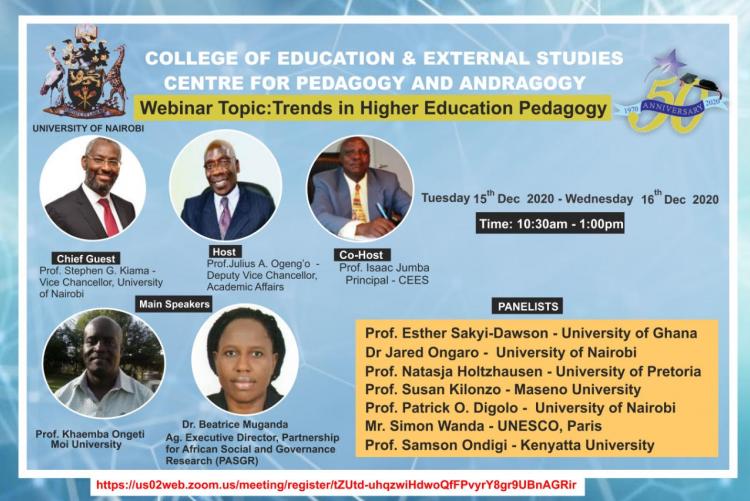Day 1: 15th December 2020
Keynote speaker: Dr. Beatrice Muganda, - Ag. Executive Director; Partnership for African Social and Governance Research (PASGR)
Topic: Trends in Higher Education Pedagogy: A Practical Guide to Innovating – The PedaL Experience.
The Centre for Pedagogy and Andragogy (CEPA) organized a 2-day webinar to discuss Trends in Higher Education. A cross-section of industry players from local and international universities and organizations were invited to participate and share their experience in matters pedagogy. This webinar is part of the #UoNat50 core activities.
The webinar attracted over 100 participants; also in attendance was the College principal Prof. Isaac Jumba, CEPA Director, Prof. Justus Inyega, staff and students from the University of Nairobi as well as Scholars from Nigeria, Ghana, and South Africa.
Dr. Beatrice Muganda began her keynote address by providing a contextual background of higher education and how various factors like Internationalization, collaboration, commodification, and massification of Education have greatly revolutionalized education as we know it. Dr. Beatrice further demonstrated how technological advancement has necessitated pedagogical transformation at a global level. The impact of technological advancement is a decentralized higher education that is dynamic, interactive, and modular. In addition, various key actors across the spectrum are now working to share ideas, resources, and expertise to feed into the pedagogical transformation. In her discussion, Dr. Beatrice also brought out the issue of teacher training stating that teacher training institutions need to revolutionalized the way they train teachers who are responsible for the implementation of the constantly changing world of education.
Dr. Beatrice called for a new or different way of organizing content and facilitating learning that yields better results linked to creativity; stating “we have shifted from a teacher-centered to a learner-centered classroom, this is a 21st-century approach to teaching”. In conclusion, Systemic change in teaching and learning practice enhanced student competencies and Quality graduates with great career prospects (Full presentation HERE)
Prof Ogengo began his opening remarks by thanking organizers of this important webinar on higher education pedagogy as part of the #uonat50 celebration, saying that it is conversations such as this that cause transformation. In his speech; Prof.Ogeng’o reflected on 5 major milestones the University has achieved over the last 5 decades; namely
- Establishment of a Robust ICT Centre
- Establishment of The Centre for Pedagogy and Andragogy
- Establishment of open and Distance Learning Campus
- Migration to online teaching and learning compelled by covid 19
- Embracing PedaL program
The University of Nairobi is alive to the fact that pedagogy must change and that the change is being driven by factors that have forced us to embrace technology and the virtual world. There is also a generational Change (generation Y and Z)) that relies heavily on technology and online teaching and online learning. The University is continuously embracing pedagogical practices that promote active learning.
During the webinar, several panelists shared their views on the trends
Highlights of their presentations:
- Prof. Esther Sakyi-Dawson - University of Ghana
We need to adopt innovation in teaching and train teachers in the new context which is driven by technology. In the past, our approach has been teacher-centered but this new context is now learner-centered. We now need to engage with our students and learn from them.
- Dr. Jared Ongaro - University of Nairobi
We are challenged as a university to train the next generation of experts, these are graduates that have comprehensive, analytic, and technical skills. The modern graduate should be able to make critical decisions. Research has shown that using blending teaching is working; students have embraced technology in their learning.
- Prof. Natasja Holtzhausen - University of Pretoria
We need to ensure that our students have access to laptops, tablets, access to data, and embed a new set of skills to make them more employable.
- Prof. Susan Kilonzo - Maseno University
We are moving towards an era where things have changed. The face to face teaching and learning may be a thing of the past and it is upon us teachers to start thinking about things that we need to turn change like managing big classes and how to equip each student with skills needed in the job market.
- Mr. Simon Wanda- UNESCO, Paris
The PedaL framework looks at the ICT competencies for teachers which are set up the main competencies that are required for teaching and technology. This framework reflects on building the capacity in university to enhance pedagogical approaches in university and provide an enabling environment to promote learning.
- Log in to post comments

